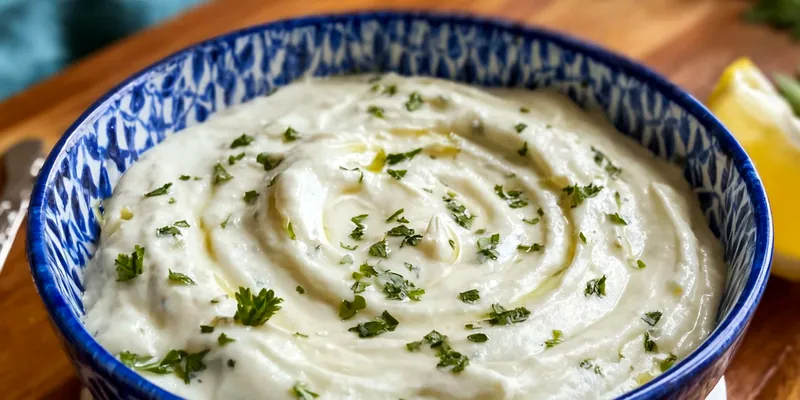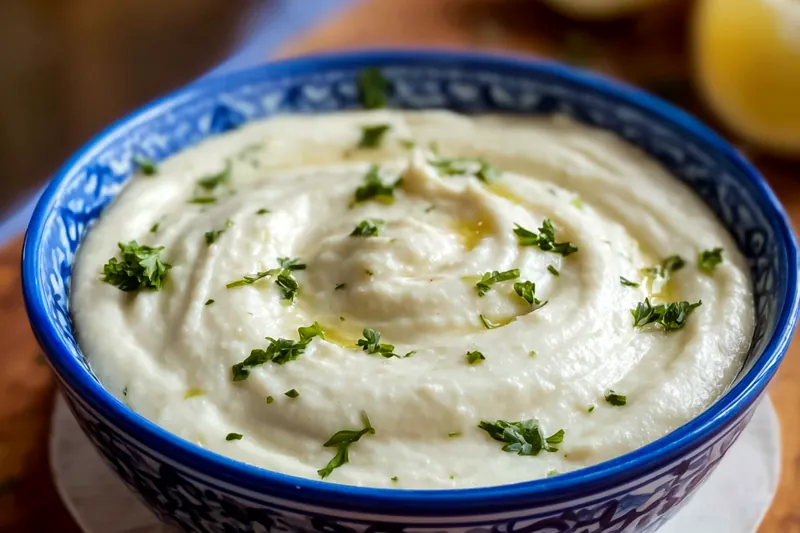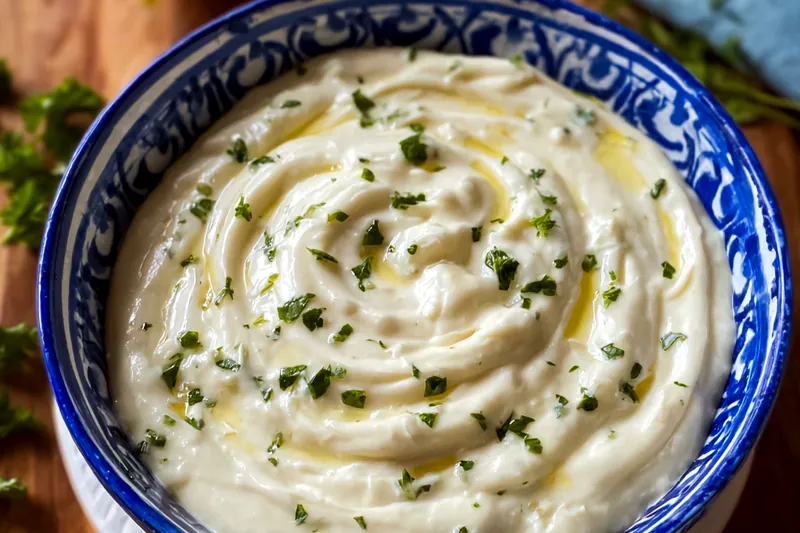Creamy White Lebanese Garlic Sauce
Authentic creamy white Lebanese garlic sauce (toum) with a smooth, fluffy texture and bold garlic flavor. Perfect condiment for grilled meats and vegetables.

The Art of Perfect Emulsification
Creating authentic Lebanese garlic sauce requires mastering the emulsification process. The key is patience - adding oil too quickly will cause the sauce to break and separate. Start with just drops of oil while the processor runs continuously, gradually increasing the stream as the mixture begins to thicken and turn white.
The transformation from a garlic paste to fluffy white sauce happens through proper technique. The salt helps break down the garlic fibers, while the slow oil incorporation creates stable emulsion. Ice water is the secret ingredient that gives toum its signature light, airy texture.
💡 Professional Tip
Keep all ingredients at room temperature for best emulsification. If the sauce breaks, start over with fresh garlic and slowly whisk the broken sauce back in drop by drop.
Frequently Asked Questions
This usually happens when oil is added too quickly. Start over with fresh garlic, then slowly whisk the broken sauce back in, treating it like oil. Patience is key.
Traditional toum is made with a mortar and pestle, but it requires significant time and effort. A food processor or high-speed blender works best for home cooks.
Store covered in the refrigerator for up to 1 month. The garlic flavor will mellow slightly over time, and the texture remains stable when properly made.
Use neutral oils like canola, sunflower, or vegetable oil. Avoid olive oil as its strong flavor can overpower the garlic and it doesn't emulsify as well.
Yes, but maintain ratios for proper emulsification. For milder sauce, use 6 cloves instead of 8, or blanch garlic briefly in boiling water first.
The sauce needs proper emulsification and sufficient processing time. Continue processing while adding ice water gradually until it reaches the right consistency.
Toum is perfect with grilled meats, shawarma, roasted vegetables, falafel, or as a spread for sandwiches and wraps. It's incredibly versatile.
Freezing can cause the emulsion to break when thawed. It's best stored in the refrigerator where it maintains quality for up to a month.
Recipe Troubleshooting Guide
Sauce Won't Emulsify
Problem: Oil and garlic won't combine into creamy sauce
Solution: Ensure garlic is completely minced to paste consistency, add oil more slowly, and make sure processor runs continuously during oil addition.
Sauce Too Thick
Problem: Mixture becomes too thick and paste-like
Solution: Add ice water gradually while processing, or thin with a small amount of lemon juice. The sauce should be fluffy but spreadable.
Bitter Flavor
Problem: Garlic sauce tastes bitter or harsh
Prevention: Remove green germs from garlic cloves, use fresh garlic, and balance with additional lemon juice. Some bitterness mellows with time.
Not White Enough
Problem: Sauce remains yellowish instead of bright white
Recovery: Use neutral oil instead of olive oil, process longer for better emulsification, and ensure proper oil-to-garlic ratio.
Sauce Separates Later
Problem: Perfectly made sauce breaks after storage
Prevention: Bring to room temperature before serving, store properly covered, and avoid temperature fluctuations in refrigerator.
Flavor Balance Issues
Too Sweet: Add more salt and a squeeze of lemon juice
Too Salty: Balance with additional lemon juice or a touch of water
Bland: Increase garlic quantity or add more salt, ensure garlic is fresh and pungent

Selecting Quality Ingredients
The beauty of toum lies in its simplicity - just a few high-quality ingredients create this magical sauce. Fresh, firm garlic cloves are essential; avoid any with green sprouts or soft spots. The garlic should be pungent and aromatic when crushed.
Choose a neutral oil with a clean flavor that won't compete with the garlic. Fresh lemon juice is crucial for both flavor and emulsification - bottled juice won't provide the same results. Coarse salt helps break down the garlic fibers more effectively than fine salt.
Essential Ingredient Notes
- Garlic Selection: Use firm, fresh garlic cloves. Remove any green germs from the center as they can add bitterness to the final sauce.
- Oil Choice: Neutral oils like canola or sunflower work best. Avoid olive oil which can overpower the garlic and doesn't emulsify as reliably.
- Lemon Juice: Always use fresh lemon juice. The acidity is important for emulsification and the fresh flavor is essential to authentic toum.

Mastering the Traditional Technique
Traditional Lebanese cooks make toum by hand with a mortar and pestle, a process that can take 30 minutes of steady work. The food processor method achieves the same results in a fraction of the time, but the principles remain the same - gradual oil incorporation and continuous agitation.
The sauce undergoes a dramatic transformation during the emulsification process. It starts as a simple garlic paste, then gradually whitens and increases in volume as oil is incorporated. The final addition of ice water creates the signature light, fluffy texture that makes toum so distinctive.
The Slow Oil Stream
Start with individual drops of oil, then increase to a thin stream as the mixture thickens. Never rush this process - it's better to go too slowly than too fast.
Creamy White Lebanese Garlic Sauce
📋 Ingredients
Base Ingredients
- 240ml neutral oil (canola or sunflower)Key to achieving proper emulsification
- 45ml fresh lemon juiceMust be freshly squeezed for best results
- 30ml ice waterCreates the signature fluffy texture
- Pinch of white pepperOptional, adds subtle warmth
For Emulsification
- 8 large garlic cloves, peeledMust be fresh and firm, remove green germs
- 1 tsp coarse saltHelps break down garlic fibers
Instructions
Prepare Garlic Base
In a food processor, pulse garlic cloves with salt until finely minced and paste-like. Scrape down sides as needed.
Start Emulsification
With processor running, slowly drizzle in oil, starting with just a few drops at a time. This is crucial for proper emulsification.
Add Lemon Juice
Once mixture begins to thicken and turn white, alternate between adding small amounts of lemon juice and continuing oil stream.
Achieve Fluffy Texture
Add ice water gradually while processing to achieve the signature fluffy, creamy texture. The sauce should be bright white and hold its shape.
Final Seasoning
Taste and adjust with additional lemon juice or salt as needed. Add white pepper if desired. Store covered in refrigerator for up to 1 month.
Recipe Notes & Tips
Storage
Store in an airtight container in the refrigerator for up to 1 month. The sauce maintains its texture well and the garlic flavor mellows slightly over time.
Serving Suggestions
Traditional accompaniment to grilled meats, shawarma, and roasted vegetables. Also excellent as a spread for sandwiches or dip for vegetables and pita bread.
Authenticity
This recipe follows traditional Lebanese proportions. For a milder version, reduce garlic to 6 cloves or blanch the garlic briefly before processing.
